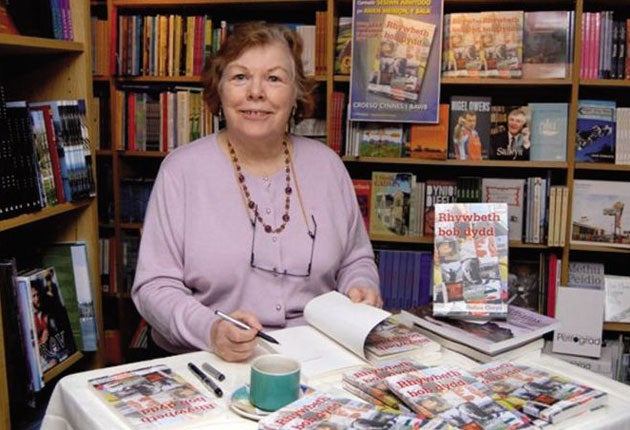Hafina Clwyd: Perceptive and vivacious journalist unafraid of courting controversy in both English and Welsh

One of the liveliest women journalists ever produced in Wales, Hafina Clwyd wrote perceptively and sometimes provocatively in both Welsh and English, often focusing on personalities making the news but sometimes on topics nearer her heart such as broadcasting, the press and cultural matters. Her weekly column in the Western Mail, the "national newspaper of Wales", was always worth reading, as was her radio and television column in Y Cymro, the weekly Welsh-language newspaper. Some of her most entertaining pieces, deliciously waspish, caused sparks to fly, but the reader was always left with the impression that she meant precisely what she said and was prepared to stand by it. This taste for controversy and a willingness to raise the hackles of the pompous and complacent went hand-in-hand with a more academic trait in her personality which found expression in her keen interest in local history and genealogy.
She was born a farmer's daughter at Gwyddelwern, near Corwen in Merioneth, in 1936, and brought up at Llanychan in the Vale of Clwyd. Educated at the girls' grammar school in Bala, she went on to the normal college in Bangor to train, despite her avowed atheism, as a teacher of religious education. There she threw herself into student life with gusto. The same conviviality and vivacity were displayed in the dizzy social whirl of the London Welsh association, of which she became a leading light soon after arriving in the city in 1957 as a schoolteacher; she ended her career as a head of department at a comprehensive in Islington. She often drew on her years in London, where she lived until 1979, in her essays and columns.
The early 1960s were a golden age in the life of the London Welsh. The young, especially those from rural, Welsh-speaking areas, had a freedom largely denied them at home by the last vestiges of a chapel culture and they grasped their opportunities in the metropolis with both hands. Those who attended the evening service in Charing Cross would often repair to a pub or to private parties, and Hafina Clwyd – she soon dropped the surname Jones – was usually to be seen where the fun was most rumbustious.
That is not to say she did not have a more serious side. She helped form Clwb Llyfrau Cymraeg, a forerunner of the Welsh books council, and was a keen member of the Honourable Society of Cymmrodorion, the ancient and most pinstripe of all the Welsh expatriate societies in London, of which she served as a vice-president. This interest in books and antiquities she brought back to Wales in 1979, when she returned with her husband, teacher and compatriot Cliff Coppack, to live in Ruthin. From 1981 to 1989 she edited Y Bedol ("The horseshoe"), the local community newspaper, and became a stalwart of the town's history group and the Clwyd family history society. She also served as a liberal democrat member and, in her turn, mayor of Ruthin town council.
Many of her articles, meticulously researched, appeared in the Transactions of the Denbighshire historical society. Her special interest was in family history, on which she was ever-ready to dilate in the manner often observed in those who know a person's history i'r nawfed ach – "to the ninth generation". Between 1986 and 1992 she also edited Y Faner ("The flag"), the venerable weekly newspaper whose radical traditions she tried to maintain in the face of a dwindling readership, but it folded soon afterwards.
A prolific author, she published 11 books, mostly collections of essays in which her feisty but engaging personality was given free rein. In Clychau yn y Glaw ("Bells in the rain", 1973) she described an idyllic childhood on the family farm; one of her anecdotes is about her small brother, a monoglot Welsh-speaker, pointing up at the sun and saying "Haul!" to a German prisoner of war, who thought he was being offensive until it was explained to him that "haul" is the Welsh word for "sun". In Defaid yn Chwerthin ("Sheep laughing", 1980) she looked back at her college days with impish humour and disarming candour.
An inveterate diarist from the age of seven, she published a racy selection of her London diaries in Buwch ar y Lein ("A cow on the line", 1987); the cover has a photograph of her as Polly Garter in a production of Under Milk Wood. With the autobiographical Merch Morfydd ("Morfydd's daughter", 1987) she came second in the Prose Medal competition at the National Eisteddfod. A selection of her articles is to be found in Clust y Wenci ("The weasel's ear", 1997). In Pobol sy'* Cyfri ("It's people who count", 2001) she delved into the 1891 census of Denbighshire, unearthing, in a house-by-house analysis, a wealth of detail about a rural community on the cusp of change. Her latest collection of essays, published in 2009, was Prynu Lein Dillad ("Buying a clothes line"), but yet another is to appear in time for the National Eisteddfod next August.
Among the honours that came her way was the white robe order of the Gorsedd of Bards in 1992 for her services to journalism in Wales, and an honorary fellowship from the University of Bangor in 2005.
Mair Hafina Clwyd Jones, journalist and essayist: born Gwyddelwern, Merioneth 1 July 1936; married 1971 Clifford Coppack (deceased; one stepdaughter); died Ruthin, Denbighshire 14 March 2011.
This article was amended on May 13 2021 to remove an incorrect reference to a stepson.
Subscribe to Independent Premium to bookmark this article
Want to bookmark your favourite articles and stories to read or reference later? Start your Independent Premium subscription today.

Join our commenting forum
Join thought-provoking conversations, follow other Independent readers and see their replies